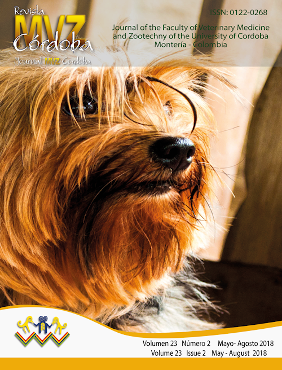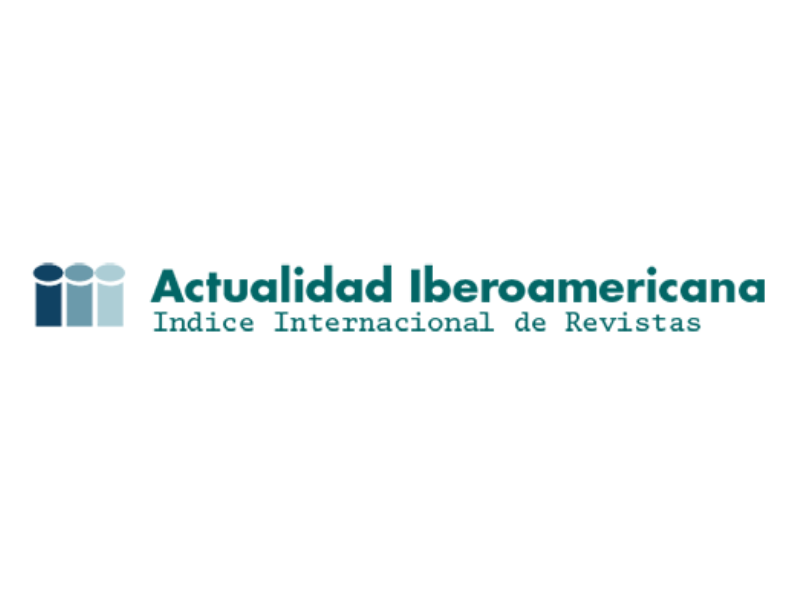Follicular and luteal morphometry, progesterone concentration and early gestation in Holstein cows (Bos Taurus) at high altitude in the tropics (Colombia)
Morfometría folicular y luteal, concentración de progesterona y éxito de la gestación en vacas Holstein (Bos Taurus) en el trópico alto (Colombia)
Show authors biography
Objectives: The aim of this study is to evaluate the relationship among ovulatory follicle (OF) size, corpus luteum (CL) volume, and progesterone (P4) serum levels with pregnancy success. Materials and methods: Nineteen Holstein cows located in Bogotá, Colombia with a history of 2 to 6 previous calving were used in the study. Following 40 day postpartum, two consecutive phases were evaluated as follows: 1) estrous cycle; 2) early pregnancy or return to estrus after Artificial Insemination (AI). Ultrasound exam was performed twice daily after first sign of estrus to evaluate OF diameter and CL volume, and serum P4 levels were evaluated on days 6, 9, 12 and 15 after ovulation. Cows were inseminated 12 hours post estrus signs and pregnancy was diagnosed 30 days post AI. Results: 47.36% of the cows were diagnosed as pregnant after AI. Pregnant cows had smaller OF diameters (17.85±2.39 mm) than non-pregnant female (21.10±2.86 mm) (p<0.05). Cows with smaller OF were more likely to become pregnant (OR=0.624, IC=95% (0.4-0.9) (p<0.05). There were no significant differences in the CL volume (p=0.10) and P4 serum values (p=0.39) between pregnant and no pregnant cows on days 6, 9, 12 and 15 post ovulation. Serum P4 levels were not correlated to CL size and reproductive status. Conclusions. This study shows that there was not significant difference in serum P4 levels and the CL volume when comparing pregnant with non-pregnant cows. A relationship was found between the OF diameter and the CL volume. Small OF diameter was a factor associated with early pregnancy.
Article visits 1548 | PDF visits
Downloads
- López-Gatius F, Garbayo JM, Santolaria P, Yániz J, Ayad A, Sousa NM, Beckers JF, 2007. Milk production correlates negatively with plasma levels of pregnancy-associated glycoprotein (PAG) during the early fetal period in high producing dairy cows with live fetuses. Domestic Animal Endocrinology. 32:29-42. https://doi.org/10.1016/j.domaniend.2005.12.007
- Roberts, RM, Ealy, AD, Alexenko, AP, Han, CS, Ezashi, T. (1999). Trophoblast interferons. Placenta, 20(4):259–264. https://doi.org/10.1053/plac.1998.0381
- Goff AK. 2002. Embryonic Signals and Survival. Reproduction in Domestic Animals. 37:133-139. https://doi.org/10.1046/j.1439-0531.2002.00344.x
- Spencer, T. (2004). Conceptus signals for establishment and maintenance of pregnancy. Animal Reproduction Science. 15:1–15. https://doi.org/10.1016/j.anireprosci.2004.04.014
- Binelli M, Machado R, Bergamaschi MACM, Bertan CM. (2009). Manipulation of ovarian and uterine function to increase conception rates in cattle. Animal Reproduction. 6:125–134.
- Busch DC, Atkins JA, Bader JF, Schafer DJ, Patterson DJ, Geary TW, Smith MF. (2008). Effect of ovulatory follicle size and expression of estrus on progesterone secretion in beef cows. Journal Animal Science. 86:553–563.
- https://doi.org/10.2527/jas.2007-0570
- Filho, MF, Crespilho, AM, Santos, JEP, Perry, GA, & Baruselli, PS. (2010). Ovarian follicle diameter at timed insemination and estrous response influence likelihood of ovulation and pregnancy after estrous synchronization with progesterone or progestin-based protocols in suckled Bos indicus cows. Animal Reproduction Science. 120(1-4):23–30. https://doi.org/10.1016/j.anireprosci.2010.03.007
- Lopes, AS, Butler, ST, Gilbert, RO, & Butler, WR. (2007). Relationship of pre-ovulatory follicle size, estradiol concentrations and season to pregnancy outcome in dairy cows. Animal Reproduction Science. 99(1-2):34–43. https://doi.org/10.1016/j.anireprosci.2006.04.056
- Machado LF, Bonilla SC, Schneider A, Schmitt E, Nunes M. 2012. Effect of the ovulatory follicle diameter and progesterone concentration on the pregnancy rate of fixed-time inseminated lactating beef cows. Revista Brasileira de Zootecnia. 41:1004-1008. https://doi.org/10.1590/S1516-35982012000400024
- Perry, GA, Smith, MF, Roberts, AJ, MacNeil, MD, & Geary, TW. (2007). Relationship between size of the ovulatory follicle and pregnancy success in beef heifers. Journal of Animal Science, 85(3):684–689. https://doi.org/10.2527/jas.2006-519
- Lynch, C.O., Kenny, D.A., Childs, S., Diskin, M.G., 2010. The relationship between periovulatory endocrine and follicular activity on corpus luteum size, function, and subsequent embryo survival. Theriogenology 73:190–198. https://doi.org/10.1016/j.theriogenology.2009.08.012
- Pfeifer, L.F.M., Mapletoft, R.J., Kastelic, J.P., Small, J.a., Adams, G.P., Dionello, N.J., & Singh, J. (2009). Effects of low versus physiologic plasma progesterone concentrations on ovarian follicular development and fertility in beef cattle. Theriogenology, 72(9):1237–1250. https://doi.org/10.1016/j.theriogenology.2009.07.019
- González J, Jiménez C, Méndez J, Ortiz L, Ruiz A, Vargas A. (1997). Levantamiento edafológico del centro Agropecuario Marengo, Bogotá, Facultad de Agronomía, Universidad Nacional de Colombia, pp. 1-64.
- Guáqueta, H., Zambrano, J., & Jiménez, C. (2014). Factores que afectan la reactivación ovárica postparto en vacas Holstein, en el trópico alto. Revista científica de la Facultad de Medicina Veterinaria y Zootecnia de la Universidad de Córdoba, 19(1):3970–3983.
- Palmer, M.A, Olmos, G., Boyle, L, & Mee, J.F. (2012). A comparison of the estrous behavior of Holstein-Friesian cows when cubicle-housed and at pasture. Theriogenology, 77(2):382–388. https://doi.org/10.1016/j.theriogenology.2011.08.010
- Martínez BR, Martínez MN, Martínez MMD. 2011. Dise-o de experimentos en ciencias agropecuarias y biológicas con SAS, SPSS, R Y STATISTIX. Fondo Nacional Universitario. Bogotá, Colombia. Pág 230-255
- Martinez, M.F, Sanderson, N, Quirke, L.D, Lawrence, S.B, & Juengel, JL. (2016). Theriogenology Association between antral follicle count and reproductive measures in New Zealand lactating dairy cows maintained in a pasture-based production system. Theriogenology, 85(3):466–475. https://doi.org/10.1016/j.theriogenology.2015.09.026
- Wolfenson, D, Inbar, G, Roth, Z, Kaim, M, Bloch, A, & Braw-Tal, R. (2004). Follicular dynamics and concentrations of steroids and gonadotropins in lactating cows and nulliparous heifers. Theriogenology, 62(6):1042–1055. https://doi.org/10.1016/j.theriogenology.2003.12.020
- Sakaguchi, M, Sasamoto, Y, Suzuki, T, Takahashi, Y, & Yamada, Y. (2004). Postpartum ovarian follicular dynamics and estrous activity in lactating dairy cows. Journal of Dairy Science, 87(7):2114–2121. https://doi.org/10.3168/jds.S0022-0302(04)70030-2
- Jaiswal, R.S., Singh, J., Marshall, L., & Adams, G.P. (2009). Repeatability of 2-wave and 3-wave patterns of ovarian follicular development during the bovine estrous cycle. Theriogenology, 72(1):81–90. https://doi.org/10.1016/j.theriogenology.2009.02.014
- Carriquiry, M., Dahlen, C.R., Weber, W.J., Lamb, G.C., & Crooker, B.A. (2009). Postpartum ovarian activity in multiparous Holstein cows treated with bovine somatotropin and fed n-3 fatty acids in early lactation 1. Journal of Dairy Science, 92(10):4876–4888. https://doi.org/10.3168/jds.2008-1676
- Kornmatitsuk, S., & Kornmatitsuk, B. (2009). Characteristics of oestrous cycles in Holstein cross-bred dairy heifers : An evidence of delayed post-ovulatory progesterone rise, Tropical Animal Health and Production 41:337–344. https://doi.org/10.1007/s11250-008-9194-6
- Noseir, W.M.B. (2003). Ovarian follicular activity and hormonal profile during estrous cycle in cows : the development of 2 versus 3 waves. Reproductive Biology and Endocrinology 1:4–9. https://doi.org/10.1186/1477-7827-1-50
- Quezada-casasola, A., Avenda-o-reyes, L., & Correa-calderón, A. (2014). Estrus behavior, ovarian dynamics, and progesterone secretion in Criollo cattle during estrous cycles with two and three follicular waves, Tropical Animal Health and Production 46:675–684. https://doi.org/10.1007/s11250-014-0562-0
- Mihm, M., Baguisi, A., Boland, M.P., & Roche, J.F. (1994). follicle and pregnancy rate in beef heifers. Journal of Reproduction and Fertility, 102:123-130. https://doi.org/10.1530/jrf.0.1020123
- Hafez, E., & Gordon, I. (1963). Superovulation and related phenomena in the beef cow and hcg injections. SUGIEf Department of Animal Science, Washington State University, Received, 5(2286):359–379.
- Mattheij, J.A.M., Swarts, J.J.M., Hurks, H.M.H., & Mulder, K. (1994). Advancement of Meiotic Resumption in Graafian-Follicles By Lh in Relation To Preovulatory Aging of Rat Oocytes. Journal of Reproduction and Fertility, 100(1):65–70.
- https://doi.org/10.1530/jrf.0.1000065
- Savio, J.D., Boland, M.P., & Roche, J.F. (1990). Development of dominant follicles and length of ovarian cycles in post-partum dairy cows. Journal of Reproduction and Fertility, 88(2):581–591.
- https://doi.org/10.1530/jrf.0.0880581
- Colazo, MG., Behrouzi, A., Ambrose, D.J., & Mapletoft, R.J. (2015). Diameter of the ovulatory follicle at timed artificial insemination as a predictor of pregnancy status in lactating dairy cows subjected to GnRH-based protocols. Theriogenology, 84(3):377–83. https://doi.org/10.1016/j.theriogenology.2015.03.034
- Forde, N., Beltman, M.E., Lonergan, P., Diskin, M., Roche, J.F., & Crowe, M. (2011). Oestrous cycles in Bos taurus cattle. Animal Reproduction Science, 124(3-4), 163–169. https://doi.org/10.1016/j.anireprosci.2010.08.025
- Vasconcelos, J.L.M., Sartori, R., Oliveira, H.N., Guenther, J. G., & Wiltbank, M. C. (2001). Reduction in size of the ovulatory follicle reduces subsequent luteal size and pregnancy rate. Theriogenology, 56(2):307–314. https://doi.org/10.1016/S0093-691X(01)00565-9
- Murdoch, W.J., & Van Kirk, E.a. (1998). Luteal dysfunction in ewes induced to ovulate early in the follicular phase. Endocrinology, 139(8), 3480–3484. https://doi.org/10.1210/endo.139.8.6137
























